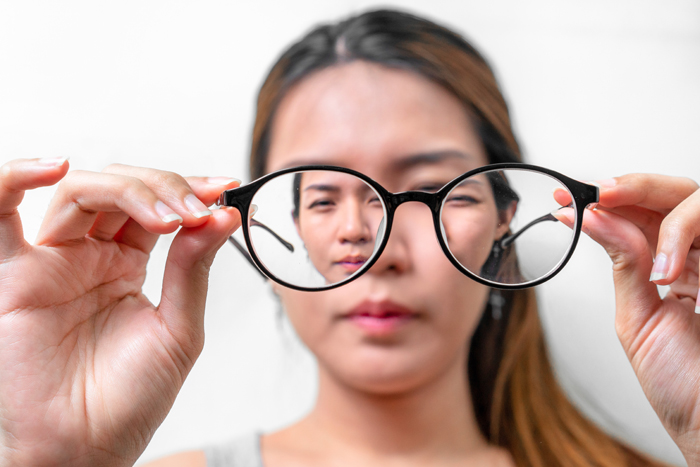Squint Eye Treatment in MRC Nagar, Chennai
A squint, also known as strabismus, is a medical condition in which the eyes do not align properly. Usually, one eye stays in one spot while the other eye turns downwards, upwards, inwards or outwards. If you face these abnormalities with one or both of your eyes, visit a squint specialist near you.
In most cases, a squint occurs because the muscles that control the movement of the eyelid and the eyes, known as extraocular muscles, do not work properly. Because of this, the eyes find it difficult to look at one spot at the same time. In other cases, a squint occurs due to a brain disorder that affects your eye's ability to coordinate with each other.

What are the types of squint?
- Esotropia - when your eye turns inwards
- Exotropia - when your eye turns outwards
- Hypotropia - when your eye turns upwards
- Hypotropia - when your eye turns downwards
What are the symptoms of a squint?
The symptoms of a squint in adults include:
- Blurred or overlapped vision
- Difficulty reading
- Eye fatigue
- Double vision
- Loss of depth perception
- A pulling sensation around the eyes
The symptoms of a squint in children include:
- Defective vision in one or both eyes
- Closing one eye in bright sunlight
- Confusion in visualization
- Tilting or turning head to use both eyes together
What causes a squint?
A squint can be:
- Congenital - present at the time of birth
- Hereditary - runs in the family
- The result of a severe illness or long-sightedness
Some of the other medical conditions that can cause a squint include:
- Hypermetropia or long-sightedness
- Myopia or short-sightedness
- Astigmatism, a condition where the cornea is not curved properly
In cases where your eye cannot focus the light as it travels through the lens, it is known as refractive error. This condition can make your eye turn inward in order to get a better focus while seeing.
Certain viral infections such as measles can also cause a squint.
When should you visit a doctor?
If you or your child experience the symptoms mentioned above, immediately consult a squint specialist in Chennai.
Request an appointment at Apollo Hospitals, MRC Nagar, Chennai.
Call 1860 500 2244 to book an appointment.
What are the treatment options for a squint?
The treatment options for a squint depend on its type and cause.
The standard treatment options include:
- Spectacles
If hypermetropia is the cause of your squint, your doctor may prescribe spectacles. - Eye patch
The doctor may recommend that you wear an eye patch on your good eye in order to make sure that the affected eye works better. - Botulinum toxin injection
Also known as botox, the doctor may recommend this treatment option if your symptoms appear suddenly and no possible causes of your squint are found.
For this procedure, the doctor will inject the muscle on the eye's surface with the botulinum toxin. The injection will temporarily weaken the muscle, which will help the affected eye align properly. - Surgery
If other treatments do not work effectively, the doctor may recommend surgery. During the surgery, the surgeon will move the muscle that connects your eyes to a new position. It will help realign your eyes and restore binocular vision.
In some severe cases, the surgeon may need to operate on both your eyes to ensure that the right balance is achieved.
Conclusion
An early diagnosis is essential for effective treatment of your squint. If you experience any problems with your vision, immediately seek medical assistance from a squint specialist in Chennai.
The correction of a squint does not usually happen on its own. Therefore, for better chances of improvement, its treatment must begin as early as possible.
Every surgery poses a risk of complications. The same holds for squint surgery. Although it is rare, you may develop an infection on the operated eye. Your doctor may give you eye drops to manage the infection. However, if you notice no changes with the eye drops, you must immediately consult a squint specialist near you.
A squint is quite common. It affects about 1 in 20 children, including babies. In most cases, children develop a squint before the age of three years. However, some older children and adults can develop squints too.
Symptoms
Our Doctors
DR. M SOUNDARAM
MBBS, MS, FCAEH...
| Experience | : | 8 Yeras Experience |
|---|---|---|
| Speciality | : | Ophthalmology... | Location | : | Alwarpet |
| Timings | : | Available by prior a... |
DR. UMA RAMESH
MBBS, DOMS, FRCS...
| Experience | : | 33 Yeras Experience |
|---|---|---|
| Speciality | : | Ophthalmology... | Location | : | Alwarpet |
| Timings | : | Sat : 12:00 PM to 1:... |
DR. MANOJ SUBHASH KHATRI
MBBS, DO, DNB, FICO(...
| Experience | : | 15 Yeras Experience |
|---|---|---|
| Speciality | : | Ophthalmology... | Location | : | Alwarpet |
| Timings | : | Available by prior a... |
DR. SRIPRIYA SANKAR
MBBS, Madras Medical...
| Experience | : | 30 Yeras Experience |
|---|---|---|
| Speciality | : | Ophthalmology... | Location | : | Alwarpet |
| Timings | : | Tue, Thur: 05:00 PM ... |
DR. PRATIK RANJAN SEN
MBBS, MS, DO...
| Experience | : | 23 Yeras Experience |
|---|---|---|
| Speciality | : | Ophthalmology... | Location | : | Alwarpet |
| Timings | : | ON CALL... |
DR. MEENAKSHI PANDE
MBBS, DO, FRCS...
| Experience | : | 27 Yeras Experience |
|---|---|---|
| Speciality | : | Ophthalmology... | Location | : | Alwarpet |
| Timings | : | Available on prior a... |
DR. ASHOK RANGARAJAN
MBBS, MS (OPHTHAL), ...
| Experience | : | 20 Yeras Experience |
|---|---|---|
| Speciality | : | Ophthalmology... | Location | : | Alwarpet |
| Timings | : | Mon, Wed, Fri : 6:00... |
DR. SAPNA K MARDI
MBBS, DNB (Opthal)...
| Experience | : | 30 Yeras Experience |
|---|---|---|
| Speciality | : | Ophthalmology... | Location | : | Alwarpet |
| Timings | : | Tue, Thur : 10:00 AM... |
DR. SRIKANTH RAMASUBRAMANIAN
MBBS, MS (Ophthal), ...
| Experience | : | 14 Yeras Experience |
|---|---|---|
| Speciality | : | Ophthalmology... | Location | : | Alwarpet |
| Timings | : | Mon, Wed, Fri | 10... |
Our Top Specialities
NOTICE BOARD
CONTACT US
CONTACT US
 Book Appointment
Book Appointment











.svg)
.svg)
.svg)
.svg)








